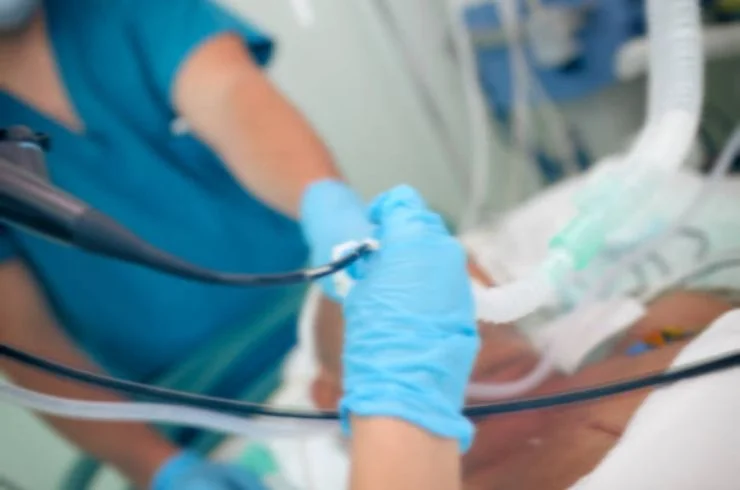
Endoscopy is a medical procedure that allows doctors to examine the internal organs and structures of the body using a flexible tube equipped with a light and camera. It is a minimally invasive procedure that provides clear visual information, helping doctors diagnose, monitor, and treat various conditions with high precision. At Saru Hospital, we offer advanced endoscopy services, ensuring accurate diagnosis and effective treatment for a wide range of gastrointestinal, respiratory, and other medical conditions.
Endoscopy involves inserting a thin, flexible tube called an endoscope through a natural body opening, such as the mouth or anus, or through a small incision. The endoscope is equipped with a camera and light, allowing doctors to view internal organs, tissues, and structures in real time on a monitor. The procedure can be used for diagnostic purposes, as well as to perform minor surgical procedures such as biopsy, tissue removal, or polyp removal.
Saru Hospital provides a wide range of endoscopic services to diagnose and treat various conditions. Some of the most common types of endoscopy procedures include:
This type of endoscopy is used to examine the digestive system, including the esophagus, stomach, small intestine, and colon. Some common GI endoscopic procedures include:
Bronchoscopy is a procedure used to examine the airways, including the trachea, bronchi, and lungs. It is commonly used to diagnose lung conditions such as infections, tumors, blockages, or chronic lung diseases. During the procedure, the doctor may also take samples for biopsy or remove foreign objects that may be obstructing the airways.
Cystoscopy is an endoscopic procedure used to examine the bladder and urethra. It is often used to diagnose urinary tract infections, bladder stones, tumors, or other issues affecting the urinary system.
Arthroscopy is used to examine and treat joint problems, such as those in the knee, shoulder, or hip. A small camera is inserted into the joint, allowing the surgeon to view the internal structures and perform procedures like repairing damaged ligaments or removing cartilage fragments.
Laparoscopy is a minimally invasive surgical procedure used to examine the abdominal and pelvic organs. It can be used for diagnostic purposes, as well as for surgical treatments, such as gallbladder removal, appendectomy, or treatment of endometriosis. A small incision is made, and the laparoscope is inserted to view the organs on a monitor.
ERCP is a specialized procedure used to examine the bile ducts, pancreatic duct, and gallbladder. It is often used to diagnose conditions like gallstones, bile duct obstructions, or pancreatic cancer. ERCP allows the doctor to remove stones, take tissue samples, or place stents if necessary.
Depending on the type of endoscopy, you may need to follow specific preparation instructions, such as:
Our medical team will provide detailed instructions based on your specific procedure and medical history to ensure the best possible outcome.
Recovery after an endoscopy procedure is generally quick, especially for minimally invasive procedures. However, you may experience mild discomfort or bloating, particularly after GI endoscopies. Common post-procedure care includes:
If you are in need of an endoscopy for diagnostic or therapeutic purposes, Saru Hospital in Mumbai offers expert care using the latest technology. Contact us today to schedule a consultation with our specialists and learn more about how our endoscopic services can help you.
No, endoscopy is generally not very painful. While you may feel some discomfort, the procedure is designed to be minimally invasive. Your doctor can provide sedation or anesthesia to help you stay comfortable during the endoscopy.
Endoscopy allows doctors to examine the inside of your body, usually your digestive system, without making large incisions. It can be used to detect issues like ulcers, bleeding, growths, or changes that may indicate a health problem.
The main purpose of endoscopy is to allow doctors to see inside your body and diagnose or treat any issues they find. It provides a way for them to visually inspect organs and tissues without having to perform major surgery.
Endoscopy is generally very safe, but like any medical procedure, it does carry some small risks. These may include bleeding, infection, or in rare cases, damage to organs. Your doctor will discuss the potential risks with you before the procedure.
Endoscopy can be used to detect a wide range of conditions, including cancer, ulcers, reflux disease, gallbladder problems, and issues with the digestive tract, urinary system, and reproductive organs.
An endoscopy allows doctors to look for the cause of symptoms like abdominal pain, difficulty swallowing, bleeding, or changes in bowel habits. It can also be used for routine cancer screening or to take a small tissue sample (biopsy) for further testing.